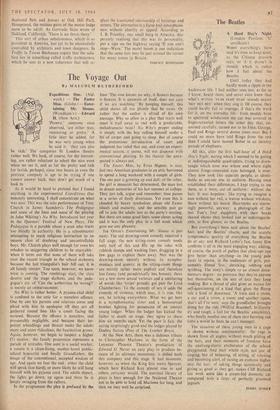By MALCOLM RUTHERFORD
The Voyage Out
Expeditions One. (Ald- wych.) — The Easter Man. (Globe.) — Enter- taining Mr. Sloane. (Wyndham's.) —Edward IL (New Arts.) `PEOPLE,' someone once observed, 'are either nice, interesting or pretty.' A little later he added, for he was very young when he said it: 'they can also be rich.' The categories fit London theatre rather well. We look, of course, for the interest- ing, are rather reluctant to admit the nice even when we see it, and as for the pretty and rich (or lavish, perhaps), since two hours in even the prettiest company is apt to be trying if one cannot answer back, they don't get much of a look in.
As it would be hard to pretend that I found anything in the experimental Expeditions One remotely interesting, I stall concentrate on what was nice. This was the solo performance of Tony Church in James Saunders's The Pedagogue and some of the lines and some of the playing in John Whiting's No Why. Introduced last year in the Questors' Festival of New Plays, The Pedagogue is a parable about a man who trusts too blindly in authority. He is a schoolmaster attempting to teach religious instruction to an unseen class of doubting and uncontrollable boys. Mr. Church plays well enough for even his rebukes to sniggering children to be enjoyable: when it turns out that none of them will take over the vacant triangle in the school orchestra because the last triangulist's hair fell out, it is all faintly sinister. Too soon, however, we know what is coming. The rumblings start, the class deserts and the stage darkens, and the peda- gogue's cry of 'Can the authorities be wrong?' is merely an embarrassment.
No Why is rather better. A pyjama-clad child is confined to the attic for a nameless offence. One by one his parents and relatives come and plead with him to apologise till they are all gathered round him like a court facing the accused. Because the offence is nameless, and presumably negligible, and because their im- potent wheedlings and threats make the adults more and more ridiculous, the fascination grows. Again, however, we begin to suspect a higher (?) motive: the family procession represents a parade of attitudes. One aunt is a social worker, a cousin is a clean-living, mother-loved public- school hypocrite and finally Grandfather, the image of the conventional, accepted wisdom of age. And again we fear the end: either the child will speak (too hard), or more likely he will hang himself with his pyjama cord. The adults depart, the lights go down, up again and there he is limply swinging from the rafters.
In the programme the play is prefaced by the lines 'The rose knows no why, it flowers because it flowers. It is unaware of itself, does not care if we are watching.' By hanging himself, this child shows all too plainly that he cares. Or rather that the author is afraid of his own message. Why so often in a play that starts well must it trail away to end with a predictable, melodramatic twist? No Why's proper ending is simply with the boy rolling himself under a bit of carpet and going to sleep. But of course the pretentious introduction of court and judgment has ruled that out, and even an experi- mental season, it seems, will not dispense with conventional plotting. In the theatre the unex- pected is always out.
The Easter Man, by Evan Hunter, is nice, just two American graduates in an attic borrowed to spend a long weekend with a couple of girls. The one pair is growing up and dull; of the other, the girl is innocent but determined, the man lost in dream memories of his last summer at college. They just talk, argue and remember; time passes in a series of lively diversions. Yet even this is clouded by heavy symbolism about old Easter rituals and maturity, and the sensible pair go off to join the adults just as the party's starting. But there are some good lines, some clever acting and it was the only play in a full week which gave me any pleasure.
Joe Orton's Entertaining Mr. Sloane is just nasty. The old drawing-room comedy required a full stage; the new sitting-room comedy needs only half of this and fills up the sides with rubbish dumps and washing lines, dragging in a few gags to explain them away. Nor was the drawing-room entirely without its nympho- maniacs and queers; in the sitting-room things • are merely rather more explicit and therefore less funny (and paradoxically less honest); there are a few more sexual varieties and a smattering of words like `titties' proudly got past the I.ord Chamberlain. To the comedy of sex it adds the comedy of violence, which may, it is true, like sex, be lurking everywhere. What we get here is a nymphomaniac sister and a homosexual brother fighting for possession of an amoral young lodger. When the lodger has kicked the father to death on stage, they agree to share him six months each. Yet the pace is fast, the acting surprisingly good and the lodger played by Dudley Sutton (Pete of The Leather Boys), At the New Arts, there was a dubious tribute to Christopher Marlowe in the form of the Leicester Phoenix Theatre's production of Edward H. Never an easy play to produce be- cause of its ultimate monotony, it defied both this company and this stage. It had moments, however, as when the King first meets Spencer. which here Richard Kay almost rose to and others certainly would. The national library of plays is bare enough for the National Theatre not to be able to hold off Marlowe for long, and then we may well be surprised.










































 Previous page
Previous page